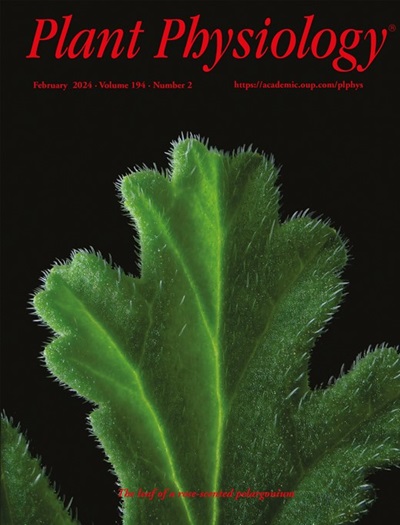Chemical-sensitized MITOGEN-ACTIVATED PROTEIN KINASE 4 provides insights into its functions in plant growth and immunity
IF 6.5
1区 生物学
Q1 PLANT SCIENCES
引用次数: 0
Abstract
Two mitogen-activated protein kinase (MAPK) cascades with MPK4 and MPK3/MPK6 as the bottommost kinases are key to plant growth/development and immune signaling. Disruption of the MPK4 cascade leads to severe dwarfism and autoimmunity, complicating the study of MPK4 in plant growth/development and immunity. In this study, we successfully rescued the Arabidopsis (Arabidopsis thaliana) mpk4 mutant using a chemical-sensitized MPK4 variant, MPK4YG, creating a conditional activity-null mpk4 mutant named MPK4SR (genotype: PMPK4:MPK4YG mpk4) that could be used to examine the functions of MPK4 in plant growth/development and immunity. We discovered that the duration of the loss of MPK4 activity is important to plant immune responses. Short-term loss of MPK4 activity did not impact flg22-induced ROS burst or resistance against Pseudomonas syringae (Pst). Enhanced Pst resistance was only observed in the MPK4SR plants with stunted growth following prolonged inhibition of MPK4 activity. Transcriptome analyses in plants with short-term loss of MPK4 activity revealed a vital role of MPK4 in regulating several housekeeping processes, including mitosis, transcription initiation, and cell wall macromolecule catabolism. Furthermore, the constitutive weak activation of MPK4GA in the MPK4CA plants (genotype: PMPK4:MPK4GA mpk4) led to early flowering and premature senescence, which was associated with its compromised resistance against Pst. These findings suggest that MPK4 plays important roles in plant growth and development and in maintaining the delicate balance between growth/development and immune adaptation in plants.通过化学敏化的 MITOGEN-ACTIVATED PROTEIN KINASE 4 深入了解其在植物生长和免疫中的功能
以 MPK4 和 MPK3/MPK6 为最底层激酶的两个丝裂原活化蛋白激酶(MAPK)级联是植物生长/发育和免疫信号转导的关键。MPK4级联的中断会导致严重的矮小症和自身免疫,这使得对MPK4在植物生长/发育和免疫中的作用的研究变得更加复杂。在这项研究中,我们利用化学敏化的 MPK4 变异体 MPK4YG 成功地挽救了拟南芥(Arabidopsis thaliana)的 mpk4 突变体,从而创建了一个名为 MPK4SR(基因型:PMPK4:MPK4YG mpk4)的条件性活性缺失 mpk4 突变体,该突变体可用于研究 MPK4 在植物生长/发育和免疫中的功能。我们发现,MPK4 活性丧失的持续时间对植物免疫反应非常重要。短期的 MPK4 活性丧失不会影响 flg22 诱导的 ROS 爆发或对假单胞菌(Pst)的抗性。只有在长期抑制 MPK4 活性后生长受阻的 MPK4SR 植物中才能观察到增强的 Pst 抗性。对短期丧失 MPK4 活性的植株进行转录组分析发现,MPK4 在调控包括有丝分裂、转录起始和细胞壁大分子分解在内的多个内务过程中发挥着重要作用。此外,在 MPK4CA 植物(基因型:PMPK4:MPK4GA mpk4)中,MPK4GA 的组成性弱激活导致提早开花和过早衰老,这与其对 Pst 的抗性受损有关。这些研究结果表明,MPK4 在植物生长和发育以及维持植物生长/发育和免疫适应之间的微妙平衡方面发挥着重要作用。
本文章由计算机程序翻译,如有差异,请以英文原文为准。
求助全文
约1分钟内获得全文
求助全文
来源期刊

Plant Physiology
生物-植物科学
CiteScore
12.20
自引率
5.40%
发文量
535
审稿时长
2.3 months
期刊介绍:
Plant Physiology® is a distinguished and highly respected journal with a rich history dating back to its establishment in 1926. It stands as a leading international publication in the field of plant biology, covering a comprehensive range of topics from the molecular and structural aspects of plant life to systems biology and ecophysiology. Recognized as the most highly cited journal in plant sciences, Plant Physiology® is a testament to its commitment to excellence and the dissemination of groundbreaking research.
As the official publication of the American Society of Plant Biologists, Plant Physiology® upholds rigorous peer-review standards, ensuring that the scientific community receives the highest quality research. The journal releases 12 issues annually, providing a steady stream of new findings and insights to its readership.
 求助内容:
求助内容: 应助结果提醒方式:
应助结果提醒方式:


